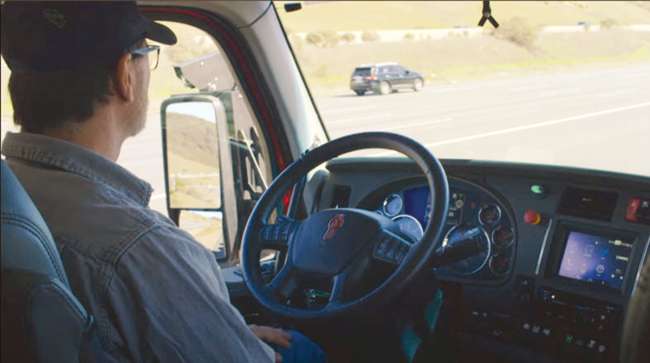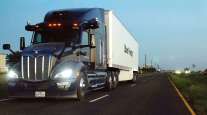Senior Reporter
California Legislators Seek to Override Veto of AV Bills

[Stay on top of transportation news: Get TTNews in your inbox.]
California legislators have reintroduced a pair of bills regulating autonomous trucks to potentially override a veto in September by Democratic Gov. Gavin Newsom.
The Assembly bill would for years ban autonomous trucks from being tested on the state’s public roads without a driver in the cab, while the Senate version would place regulatory decisions regarding heavy driverless vehicles with local jurisdictions.
The Assembly and Senate versions of the new bill, introduced earlier this year, have yet to be voted on.
The 2023 versions of the Assembly bill, supported by the Teamsters union, passed nearly unanimously in both legislative chambers. The new Assembly bill, AB 2286, would require a trained human operator to be behind the wheel of self-driving trucks weighing more than 10,000 pounds until Jan. 1, 2030, and would require testers of autonomous trucks to carry $5 million in insurance.

Newsom
The Assembly bill also would require the state’s Department of Motor Vehicles, beginning with model year 2031 trucks, to submit a report to the appropriate policy and fiscal committees of the Legislature evaluating the performance of autonomous vehicle technology and its impact on public safety and employment in the transportation sector.
The report also would include a summary of disengagements, crashes and other information the department believes is relevant, and must include a recommendation on whether the Legislature should remove, modify or maintain the requirement for an autonomous vehicle to operate with a human safety operator physically present at the wheel.

Aguiar-Curry
“The Legislature must have a role in protecting public safety and our state workers,” Assembly majority leader Cecilia Aguiar-Curry and sponsor of AB 2286, said at a recent news conference. “This common-sense measure keeps humans on board the trucks until we have a plan that tech bros aren’t jamming unsafe technology down our throats.”
But Jeff Farrah, CEO of the Autonomous Vehicle Industry Association, said in a statement last month that the Senate version of the legislation, SB 915, would “halt AVs progress in California and harm those seeking new mobility opportunities.”

Farrah
The Senate bill would require each city, county, or city and county that enacts an ordinance to account for certain provisions within that ordinance. These would include a policy for entry into the business of providing autonomous vehicle services, including a permitting program that contains the establishment of reasonable vehicle caps and hours-of-service restrictions.
“We urge lawmakers to reject SB 915 — a bill that is equivalent to needing a different driver’s license for every city a driver passes through,” Farrah’s statement. “Cities are critical partners for AV companies, and the AV industry is committed to fostering close and collaborative relationships with city officials and local law enforcement to ensure AVs’ safety, accessibility and economic benefits become a reality.”
If #SB915 is adopted in California, this is what taking an autonomous vehicle trip will look like.
That's because the bill allows local governments to implement their own rules for AVs which will result in AVs being unavailable in many parts of the state. pic.twitter.com/g07eqWmdiw — Safer Roads for All (@saferroadsorg) April 24, 2024
Last month, the California Chamber of Commerce, Uber, Waymo and 65 other groups and cities sent an opposition letter to Senate leaders.
“Autonomous vehicles are making our roads safer, boosting supply chain efficiency and creating new, high-quality career opportunities for California workers,” the letter said. “SB 915 would undermine the ability of California’s state authorities to regulate AVs while adding no benefit to safety and undermining accessibility for Californians.
“AVs will create new, high-quality jobs while avoiding displacement of current drivers. In addition to enhancing safety on our roadways and increasing mobility, the AV industry is currently leveraging the existing workforce to create new roles for all education and skill levels.”
Want more news? Listen to today's daily briefing below or go here for more info:




